The most popular DVDs in our library
A very important part of Instituto Cervantes in London is our library and the movies available to borrow in DVD. We introduce in this post a selection of the most popular ones among our users:
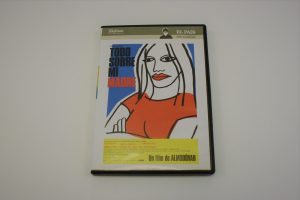
All About My Mother is a film by Pedro Almodóvar. A Greek saying states that only women who have washed their eyes with tears can see clearly. This saying does not hold true for Manuela. The night a car ran over her son Esteban, Manuela cried until her eyes ran completely dry. Far from seeing clearly, the present and the future become mixed up in darkness.
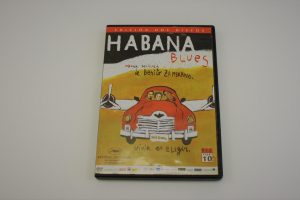
Havana Blues is a 2005 Spanish and Cuban film by Benito Zambrano, which tells the story of two young musicians in Cuba. The film revolves around their music and contains criticism of problems in Cuba such as poverty and electricity outages.
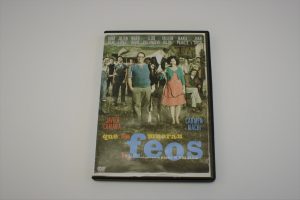
To Hell With The Ugly is a film by Nacho Garcia Velilla. Eliseo (Javier Cámara) is ugly, lame and single. He still hasn’t found the woman of his dreams and he doesn’t really know what love is. Nati (Carmen Machi) is similarly ugly and is currently separated. She’s just met the man of her dreams but she doesn’t know what real love is either. Eliseo, on the other hand, fears that the worst is just around the corner, whilst Nati fantasises that the best is yet to come.
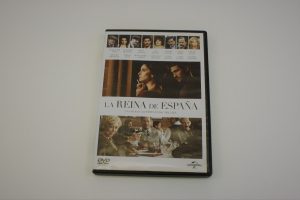
The Queen of Spain is a film by Fernando Trueba. Eighteen years after fleeing Nazi Germany, Spanish film actress Macarena Granada becomes a major Hollywood star. She returns to Spain to play Isabella I of Castille, surrounded by showbiz hype.
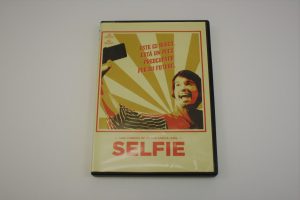
Selfie is a movie by Víctor García León. A privileged young man in Madrid gets a reality check when his father is arrested on corruption charges and all of the family’s assets are seized.

Skins is a film by Eduardo Casanova. Deformed, disfigured characters must find a way to deal with society shunning their differences.
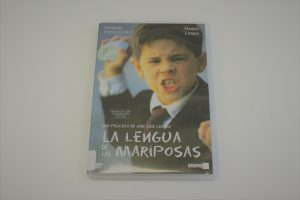
Butterfly’s Tongue is a film by José Luis Cuerda. The heartwarming story of the relationship that develops between a shy young boy and his kind teacher in 1936 Spain. The boy, Moncho, is frightened about starting school, and it is up to the gentle, compassionate Don Gregorio to set the boy’s mind at ease. When the Spanish Civil War erupts, both individuals’ lives are changed forever.
Los DVD más populares de nuestra biblioteca
Una parte muy importante de la biblioteca del Instituto Cervantes en Londres es la sección de películas en DVD. Os presentamos una selección de las más prestadas y las más populares entre nuestros usuarios:

Todo sobre mi madre es una película de Pedro Almodóvar. Un dicho griego dice que solo las mujeres que se han lavado los ojos con lágrimas pueden ver con claridad. Este dicho no es válido para Manuela. La noche que un automóvil atropelló a su hijo Esteban, Manuela lloró hasta que sus ojos se secaron por completo. Lejos de ver claramente, el presente y el futuro se mezclan en la oscuridad.

Habana Blues es una película hispanocubana de 2005 de Benito Zambrano, que cuenta la historia de dos músicos jóvenes en Cuba. La película gira en torno a su música y contiene críticas a los problemas en Cuba, como la pobreza y los cortes de electricidad.

Qué se mueran los feos es una película de Nacho García Velilla. Eliseo (Javier Cámara) es feo, cojo y soltero. Todavía no ha encontrado a la mujer de sus sueños y realmente no sabe qué es el amor. Nati (Carmen Machi) es también fea y actualmente está separada. Acaba de conocer al hombre de sus sueños, pero tampoco sabe qué es el verdadero amor. Eliseo, por otro lado, teme que lo peor esté a la vuelta de la esquina, mientras que Nati fantasea con que lo mejor está por venir.

La Reina de España es una película de Fernando Trueba. Dieciocho años después de huir de la Alemania nazi, la actriz española Macarena Granada se convierte en una gran estrella de Hollywood. y regresa a España para interpretar a Isabel I de Castilla, rodeada de exageraciones publicitarias.

Selfie es una película de Víctor García León. Un joven privilegiado en Madrid recibe una verificación de la realidad cuando su padre es arrestado por cargos de corrupción y todos los bienes de la familia son incautados.

Pieles es una película de Eduardo Casanova. Los personajes deformados y desfigurados deben encontrar una manera de lidiar con la sociedad evitando sus diferencias.

La lengua de las mariposas es una película de José Luis Cuerda. La conmovedora historia de la relación que se desarrolla entre un niño tímido y su amable maestro en la España de 1936 . El niño, Moncho, tiene miedo de comenzar la escuela, y le corresponde al gentil y compasivo Don Gregorio tranquilizarlo. Cuando estalla la Guerra Civil española, las vidas de ambos individuos cambian para siempre


